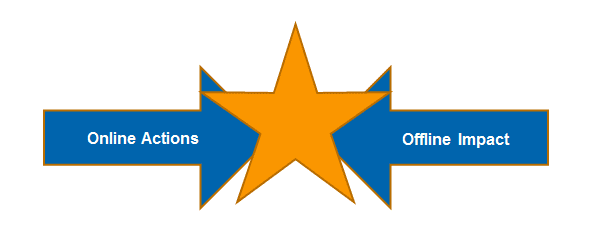How can foundations get smarter about how they invest in social media strategies to drive social change?
Two weeks ago I attended a convening hosted by Robert Wood Johnson Foundation that discussed this among other topics related to social media measurement. The goal was to start a conversation between people engaged in grantmaking, communication, social media, and evaluation about how to measure the impact of social media strategies.
As an evaluator in the social media strategies space, I had the privilege of sitting on the opening panel with social media guru, Beth Kanter, and one of our strategic learning and evaluation clients, Mayur Patel of Knight Foundation. Beth has written an excellent account of the meeting in a recent blog post.
One of the big questions at the conference was how to link social media strategies to the end-game impact that foundations and nonprofits are hoping to achieve. For example, how do you know whether getting people to fill out online petitions is influencing policymakers’ attitudes on an issue? In order to link social media strategies to social change, you need to look at the intersection between online action and offline impact.
Ultimately, the change you hope to see is real world change – not virtual. You probably are not just interested in knowing that more people are making positive comments on Facebook. Rather, you want to know that the positive comments are a) from those you want to be reaching and engaging, and b) that their attitudes have changed, or they are more likely to take a desired action, or they will use your product or service.
There are multiple ways to gather information at the intersection between what’s happening online and offline. A few of the most common are:
- Surveys (post-event or audience)
- Interviews with target audiences
- Content or thematic analysis (website or social media)
- Registered user surveys
One simple example comes from our evaluation of Knight Foundation’s Community Information Challenge. We worked with staff at The Notebook, an education-focused news site in Philadelphia, to understand how their online news coverage was affecting the attitudes and behaviors of educators and school officials. By conducting interviews with members of these groups, we learned the types of changes that the The Notebook has been contributing to and amongst whom. This provided The Notebook staff, leadership, and funders with evidence to support that the news outlet was achieving its mission of creating a more transparent, accountable, and fair education system.
There are many great resources on this topic, including FSG’s IMPACT guide on evaluating community information (i.e., online and digital media) projects. You can also check out more resources on RWJF’s Advancing Social Media Measurement website and on Twitter #sm_re.
You can view and download my full presentation from the RWJF convening on SlideShare.

